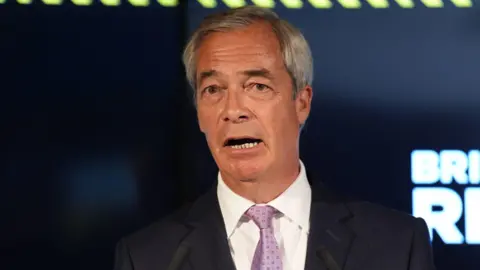In a recent political clash, Nigel Farage, the leader of Reform UK, has called upon Technology Secretary Peter Kyle to offer an apology regarding comments made about the government’s online safety law. Kyle suggested that opposing the law puts Farage and his party in alliance with notorious sex offenders, specifically referencing the infamous Jimmy Savile. This accusation has sparked a significant backlash from Farage and his colleagues, indicating a deeper divide over the issue of online safety and free speech.
The controversy erupted after Kyle’s comments on Sky News, where he unequivocally stated, “Make no mistake, if people like Jimmy Savile were alive today, he would be perpetrating his crimes online – and Nigel Farage is on their side.” These remarks were made in the context of the new online safety legislation recently introduced, which Farage has openly criticized, labeling it as an infringement on free speech and ineffective at protecting children.
In response to Kyle’s statements, Farage described the comments as “disgusting,” denouncing the implication that his party’s stance on the online safety law equates to supporting predators. Zia Yusuf, a fellow Reform UK member, echoed these sentiments, branding Kyle’s assertions as “one of the most appalling things I’ve seen in my political life.” The rhetoric surrounding the issue reflects not only political animosity but also highlights the complexities and sensitivities involved in legislation aimed at online safety.
Despite the backlash, Secretary Kyle remained adamant about his position. He reiterated his stance via social media, stating, “If you want to overturn the Online Safety Act, you are on the side of predators. It is as simple as that.” This response underscores the urgency and seriousness with which the government views the implementation of the Online Safety Act, which is designed to prevent children from encountering harmful or inappropriate content online.
Savile, who was a beloved figure and television presenter, was later revealed to be a prolific sexual predator, using his celebrity status to exploit vulnerable individuals. This notorious case continues to shape discussions surrounding child protection efforts and the need for robust online safety measures.
The Online Safety Act, which aims to enforce stricter regulations on tech firms regarding age verification and the swift handling of harmful content, has garnered criticism from various political factions. Opponents, including members of Reform UK, argue that the law is not effectively designed to protect children while simultaneously imposing limitations on freedom of speech. Critics are particularly concerned that the law could force minors to seek out less safe online environments, such as the dark web, in order to bypass new age verification requirements.
Over the weekend, Yusuf drew attention to a notable consequence of the new regulations: a significant uptick in virtual private network (VPN) downloads as users attempt to evade the measures. He warned that this situation could inadvertently expose children to even greater risks online.
While discussing the efficacy of the new law, Kyle admitted that “some people are finding their way round” the rules but insisted that the measures taken represent a “huge, giant, unprecedented step forward in stopping harmful content finding its way into children’s feeds.” He emphasized the importance of these regulations while expressing confidence in the ongoing improvements that would continue to evolve alongside technology.
The exchange between Farage and Kyle culminates in a larger narrative about political accountability, the framing of safety issues in the online sphere, and the ethical landscape of child protection in a digital age. Farage’s threat to repeal the Online Safety Act if Reform UK gains power further complicates the political landscape and reflects his party’s dedication to opposing what they perceive as government overreach in regulating online content. As the political discourse surrounding this issue intensifies, the public remains keenly aware of the stakes involved in balancing safety, free expression, and ethical governance.











